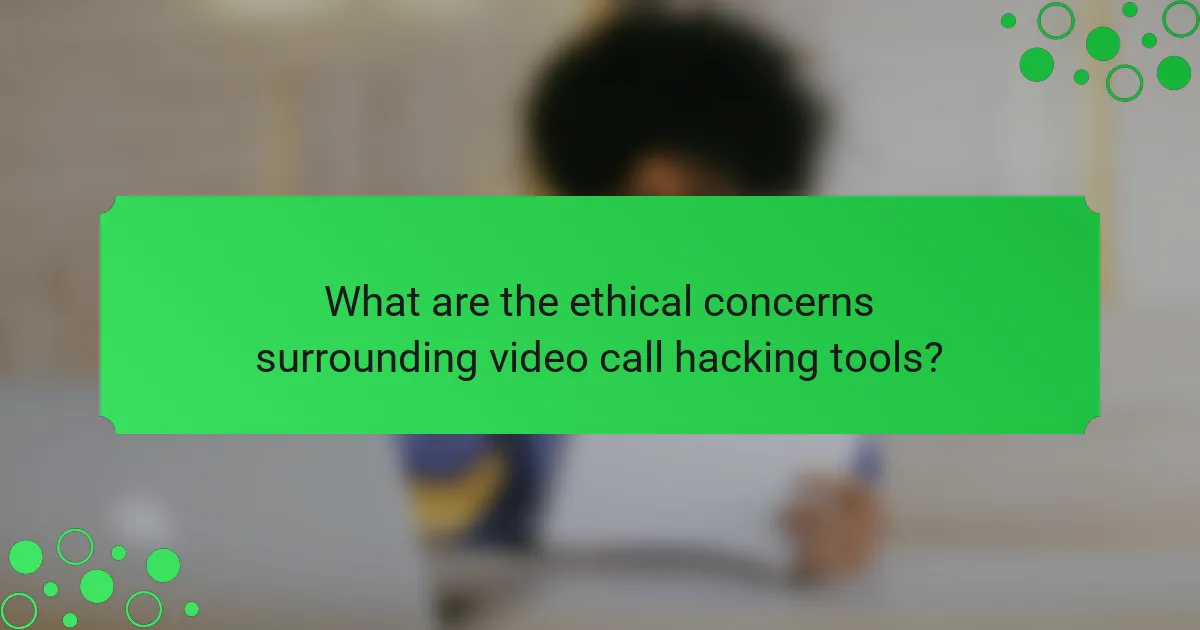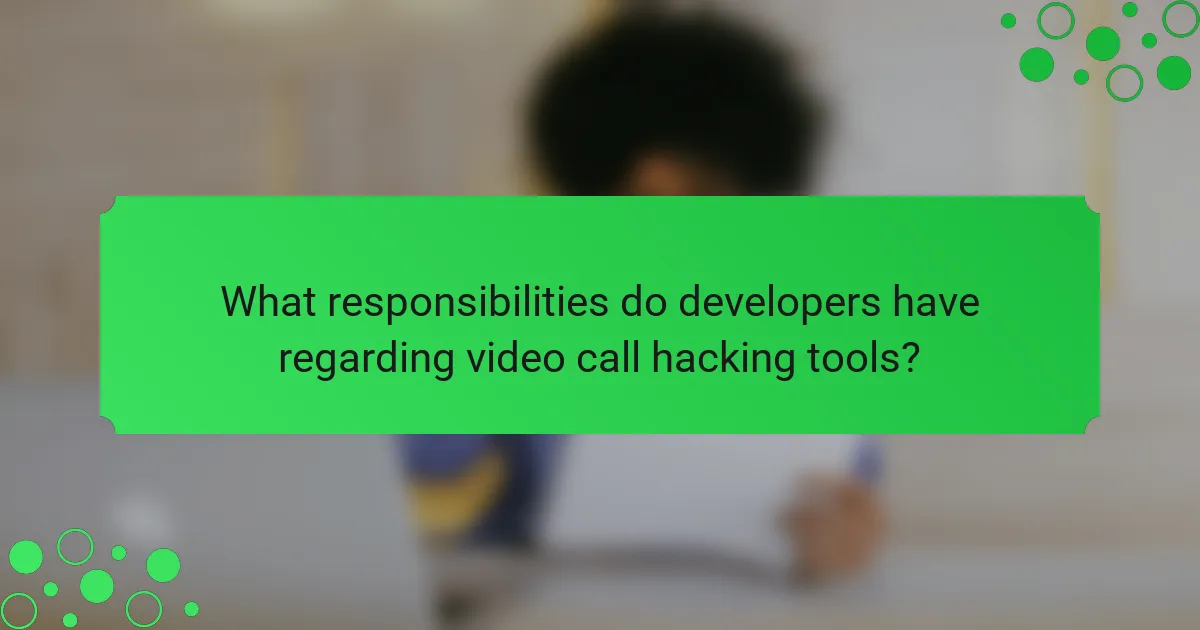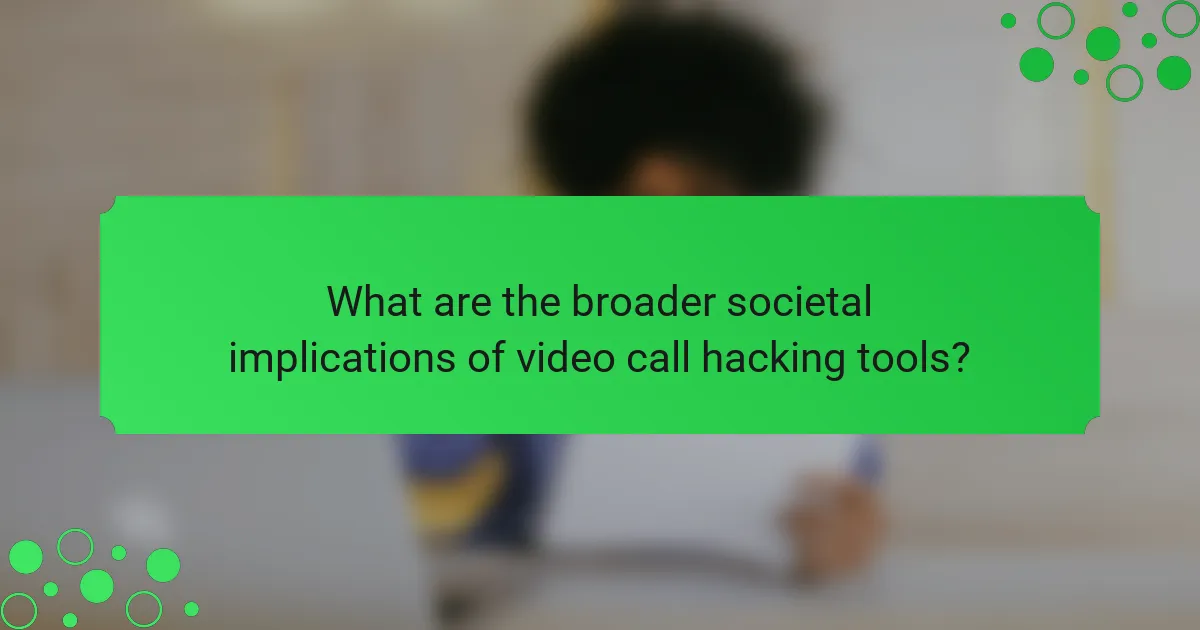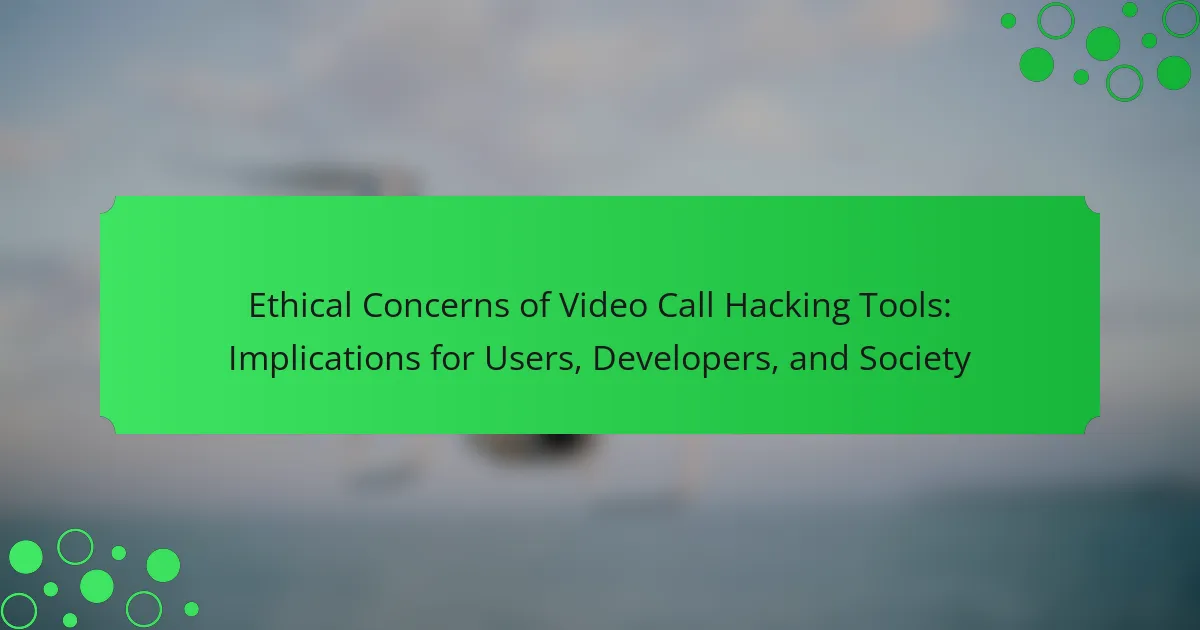Video call hacking tools present significant ethical concerns, primarily related to privacy violations and the lack of consent in accessing private conversations. These tools can lead to unauthorized surveillance, harassment, and exploitation, undermining trust in digital communication platforms. The increase in incidents of video call hacking, particularly during the pandemic, raises alarms about the societal implications, including the chilling effects on free speech and the potential for corporate espionage. Developers are urged to implement robust security measures, educate users on risks, and adhere to ethical guidelines to protect user data and maintain privacy. The article emphasizes the urgent need for stronger regulations and ethical frameworks in technology development to address these pressing issues.

What are the ethical concerns surrounding video call hacking tools?
Video call hacking tools raise significant ethical concerns primarily related to privacy violations and consent. These tools can be used to unlawfully access private conversations without the knowledge of participants. This intrusion undermines trust in digital communication platforms. Additionally, the use of such tools can lead to harassment and exploitation of vulnerable individuals. The potential for misuse in corporate espionage also poses ethical dilemmas. As reported by the Electronic Frontier Foundation, unauthorized surveillance can lead to chilling effects on free speech. Overall, these concerns highlight the need for stronger regulations and ethical guidelines in technology development and usage.
How do video call hacking tools operate?
Video call hacking tools operate by exploiting vulnerabilities in video conferencing software. These tools can intercept data packets transmitted during a call. They may use methods such as phishing to gain access to user credentials. Some tools manipulate software settings to enable unauthorized access. Others may deploy malware to compromise device security.
Research indicates that video conferencing platforms often have security flaws. For instance, a 2020 report by Cybersecurity and Infrastructure Security Agency (CISA) highlighted common vulnerabilities in popular video conferencing applications. These vulnerabilities can be exploited by hackers to gain unauthorized access to meetings.
What techniques are commonly used in video call hacking?
Common techniques used in video call hacking include phishing, malware injection, and exploiting software vulnerabilities. Phishing involves tricking users into revealing their login credentials. Attackers often send fake links that appear legitimate. Malware injection can compromise devices by installing malicious software during a video call. This software can access the camera and microphone without user knowledge. Exploiting software vulnerabilities takes advantage of flaws in video conferencing platforms. For example, unpatched software can be an easy target for attackers. These techniques are documented in cybersecurity reports highlighting the risks associated with video conferencing tools.
What vulnerabilities in video call platforms do hackers exploit?
Hackers exploit several vulnerabilities in video call platforms. Common vulnerabilities include weak authentication processes. Insecure connections allow interception of data. Unpatched software presents opportunities for exploitation. Poorly designed user interfaces can lead to accidental data sharing. Misconfigurations in privacy settings can expose personal information. Additionally, vulnerabilities in third-party integrations can be targeted. A report by the Cybersecurity and Infrastructure Security Agency (CISA) highlights these issues, stressing the importance of robust security measures.
Why is the ethical use of video call technology important?
The ethical use of video call technology is important to protect user privacy and security. Video calls often involve sensitive information and personal data. Ethical practices ensure that this data is not misused or exploited. According to a 2021 study by the Pew Research Center, 54% of Americans expressed concern about their privacy during video calls. Ensuring ethical standards can build trust between users and service providers. Ethical use also promotes accountability among developers to create secure platforms. Furthermore, it helps prevent unauthorized access and hacking incidents. This is crucial in maintaining a safe digital communication environment.
How do ethical considerations impact user trust in video call platforms?
Ethical considerations significantly impact user trust in video call platforms. Users expect their privacy and data to be protected. When platforms fail to uphold ethical standards, trust diminishes. For instance, data breaches can lead to sensitive information being exposed. A study by Pew Research Center revealed that 81% of users feel they have little control over their data online. Transparency in data usage enhances user confidence. Ethical practices, such as informed consent, are crucial for maintaining trust. Platforms that prioritize ethics tend to foster stronger user loyalty and engagement.
What role do developers play in maintaining ethical standards?
Developers play a crucial role in maintaining ethical standards in technology. They are responsible for designing software that prioritizes user privacy and security. Ethical developers implement safeguards against misuse and unauthorized access. This includes creating robust encryption and transparent data handling practices. They also adhere to legal regulations and industry standards. By doing so, developers help build trust with users. Furthermore, they engage in ongoing education about ethical implications. This awareness allows developers to anticipate potential risks associated with their tools. Ultimately, their commitment to ethical practices shapes the overall integrity of technology.
What are the implications of video call hacking for users?
Video call hacking poses significant risks for users. It can lead to unauthorized access to private conversations. Hackers may capture sensitive information, such as personal details and financial data. Users could face identity theft or financial loss as a result. Additionally, video call hacking can damage reputations if private discussions are leaked. The emotional impact on victims can include anxiety and distrust in digital communications. Studies show that 70% of users feel vulnerable to such attacks. Protecting against video call hacking requires strong security measures and user awareness.
How can users protect themselves from video call hacking?
Users can protect themselves from video call hacking by implementing strong security measures. They should use unique, complex passwords for their video conferencing accounts. Enabling two-factor authentication adds an extra layer of security. Users should regularly update their video call software to patch vulnerabilities. They must avoid sharing meeting links publicly or on social media. Utilizing waiting rooms can control who joins a call. Users should be cautious about accepting invitations from unknown participants. Lastly, they should familiarize themselves with the privacy settings of their video conferencing tools to enhance their security.
What psychological effects can hacking incidents have on users?
Hacking incidents can lead to significant psychological effects on users. Users often experience anxiety and fear after a hacking event. This anxiety may stem from concerns about privacy violations and personal safety. Users might also suffer from feelings of helplessness or loss of control over their digital lives. Depression can occur, particularly if sensitive information is exposed or misused. Trust issues may arise, causing users to become wary of technology and online interactions. Research indicates that victims of hacking can experience long-term emotional distress, impacting their daily lives. A study by the University of Maryland found that individuals affected by cyber incidents reported increased levels of stress and mental health issues.

What responsibilities do developers have regarding video call hacking tools?
Developers have a responsibility to create secure video call applications to prevent hacking tools. They must implement robust encryption methods to protect user data. Regular security updates are essential to address vulnerabilities. Developers should also educate users about potential risks and safe usage practices. Transparency in data handling and privacy policies is crucial. They must comply with legal regulations regarding user privacy and data protection. Ethical considerations should guide their design choices to minimize misuse. Developers should actively monitor for threats and respond promptly to any security breaches.
How can developers mitigate the risks of video call hacking?
Developers can mitigate the risks of video call hacking by implementing strong encryption protocols. End-to-end encryption ensures that only participants can access the video and audio streams. Regular software updates close security vulnerabilities. Developers should also employ multi-factor authentication to verify user identities. This adds an extra layer of security against unauthorized access.
Secure coding practices are essential to prevent common vulnerabilities. For instance, protecting against cross-site scripting (XSS) and SQL injection attacks is crucial. Additionally, user education on recognizing phishing attempts enhances overall security. According to a 2020 study by Cybersecurity Ventures, cybercrime is projected to cost the world $10.5 trillion annually by 2025, highlighting the importance of robust security measures.
What best practices should developers follow to enhance security?
Developers should follow several best practices to enhance security. First, they must implement secure coding practices. This includes validating input to prevent injection attacks. Regularly updating software is crucial to patch vulnerabilities. Developers should also utilize encryption for data in transit and at rest. Conducting regular security audits can identify potential weaknesses. Employing multi-factor authentication adds an additional layer of security. Finally, training staff on security awareness is vital to prevent human error. These practices help mitigate risks associated with video call hacking tools.
How can developers educate users about potential threats?
Developers can educate users about potential threats through clear communication and practical resources. They should provide detailed information on common security risks associated with video calls. This can include guides on recognizing phishing attempts and unauthorized access. Developers can also implement in-app notifications about security updates and best practices. Regular webinars or tutorials can enhance user awareness of evolving threats. Additionally, developers should create accessible FAQs addressing user concerns. By fostering an open dialogue, developers can empower users to take proactive measures. Engaging with users through feedback can also identify areas needing further education.
What legal frameworks exist to address video call hacking?
Legal frameworks addressing video call hacking include various cybersecurity laws and regulations. In the United States, the Computer Fraud and Abuse Act (CFAA) prohibits unauthorized access to computer systems. This law applies to video conferencing platforms as they are considered computer systems. The Electronic Communications Privacy Act (ECPA) also protects the privacy of electronic communications, including video calls.
Internationally, the General Data Protection Regulation (GDPR) in Europe mandates strict data protection measures for personal information shared during video calls. The Budapest Convention on Cybercrime serves as a framework for international cooperation against cybercrime, including video call hacking.
These laws provide legal recourse for victims and set penalties for offenders, reinforcing the importance of cybersecurity in video communications.
What are the consequences for developers who create hacking tools?
Developers who create hacking tools face legal consequences, including criminal charges. Laws such as the Computer Fraud and Abuse Act in the U.S. can lead to significant penalties. These penalties may include fines and imprisonment for up to 10 years. Additionally, developers may face civil lawsuits from affected parties. Reputational damage is another consequence, impacting future career opportunities. Companies may blacklist developers involved in creating such tools. Ethical considerations also play a role, as these actions can harm the trust in technology. Overall, the risks associated with creating hacking tools are substantial and multifaceted.
How do laws vary across different regions regarding video call privacy?
Laws regarding video call privacy vary significantly across different regions. In the United States, privacy laws are primarily state-based, leading to a patchwork of regulations. For instance, California’s Consumer Privacy Act provides strong protections for personal data, including video calls. In contrast, the European Union enforces the General Data Protection Regulation, which mandates strict consent for data processing, including video communications. Countries like Canada also have specific privacy laws that govern electronic communications, ensuring user consent and transparency. Meanwhile, regions with less developed legal frameworks may have minimal or no regulations concerning video call privacy, leaving users vulnerable. These differences highlight the need for individuals to understand local laws to protect their privacy effectively.

What are the broader societal implications of video call hacking tools?
Video call hacking tools pose significant societal implications by undermining privacy and security. These tools can facilitate unauthorized access to personal and sensitive information. The prevalence of such hacking tools can lead to a general distrust in video communication platforms. According to a 2021 report by the Cybersecurity & Infrastructure Security Agency, incidents of video call hacking increased by over 200% during the pandemic. This rise in incidents can have a chilling effect on open communication, especially in professional and educational settings. Additionally, the misuse of these tools can result in harassment and cyberbullying, impacting mental health. The societal normalization of video call hacking may erode ethical standards in technology usage. Ultimately, these implications highlight the need for stronger cybersecurity measures and ethical guidelines in technology development.
How does video call hacking affect public perception of technology?
Video call hacking negatively affects public perception of technology. It raises concerns about privacy and security. Users become wary of adopting new communication tools. Reports of hacking incidents contribute to fear and distrust. A survey by Pew Research Center found that 64% of Americans express concern about online privacy. This skepticism can hinder technological advancements. Developers face pressure to enhance security measures. Overall, video call hacking shapes a cautious attitude towards emerging technologies.
What impact does video call hacking have on remote work culture?
Video call hacking significantly undermines trust in remote work culture. It creates a climate of fear among employees regarding their privacy. Workers may feel vulnerable during virtual meetings, leading to decreased participation. This anxiety can hinder effective communication and collaboration. Research indicates that 70% of remote workers express concerns about their online security. Additionally, organizations may face reputational damage if breaches occur. Such incidents can deter talent and reduce overall productivity. Ultimately, video call hacking disrupts the foundational trust necessary for successful remote work environments.
How can society balance innovation and security in video communication?
Society can balance innovation and security in video communication by implementing strict regulations and advanced encryption methods. Regulations can ensure that developers adhere to security standards. Advanced encryption protects user data during transmission. Regular audits of video communication platforms can identify vulnerabilities. Collaboration between tech companies and security experts enhances innovation while maintaining safety. Public awareness campaigns educate users on security practices. Legislative measures can enforce accountability for data breaches. These strategies create a framework that fosters innovation without compromising security.
What steps can be taken to promote ethical practices in video communication?
To promote ethical practices in video communication, organizations should implement clear guidelines for usage. These guidelines must address privacy, consent, and security measures. Training sessions can educate users about ethical standards and best practices. Regular audits can ensure compliance with these standards. Additionally, employing encryption can protect sensitive information during video calls. Transparency about data usage fosters trust among participants. Finally, encouraging feedback can help improve ethical practices over time.
How can users advocate for better security measures in video calls?
Users can advocate for better security measures in video calls by actively participating in discussions about privacy policies. They should engage with service providers to express their concerns about current security features. Users can also support organizations that promote digital rights and privacy. Sharing information about security vulnerabilities can raise awareness within the community. Additionally, users can request transparency reports from video call platforms regarding their security practices. Joining forums and online communities dedicated to digital security can amplify their voices. According to a 2021 survey by the Pew Research Center, 81% of Americans feel they have little control over their personal data, highlighting the need for advocacy.
What role does education play in preventing video call hacking?
Education plays a crucial role in preventing video call hacking by informing users about security risks. It equips individuals with knowledge on safe practices for using video conferencing tools. For instance, understanding the importance of strong passwords can deter unauthorized access. Education also raises awareness about recognizing phishing attempts and suspicious links. Training programs can teach users how to enable security features like two-factor authentication. Research indicates that organizations with regular cybersecurity training see a significant reduction in breaches. A study by the Ponemon Institute found that 60% of data breaches are linked to human error. Thus, informed users are less likely to fall victim to hacking attempts.
What are practical tips for ensuring secure video calls?
Use strong passwords for video call accounts. This prevents unauthorized access. Enable two-factor authentication for added security. This adds an extra layer of protection. Keep software updated to patch vulnerabilities. Regular updates can prevent exploitation by hackers. Use secure networks, avoiding public Wi-Fi. Public networks are more susceptible to breaches. Lock meetings with passwords or waiting rooms. This controls who can join the call. Disable screen sharing for unknown participants. This limits potential data leaks. Be cautious about sharing sensitive information. Sharing can lead to unintended exposure.
The main entity of the article is video call hacking tools, which raise significant ethical concerns related to privacy violations, consent, and the potential for misuse. The article explores how these tools operate, the techniques hackers use, and the vulnerabilities they exploit in video conferencing platforms. It discusses the importance of ethical practices for developers to maintain user trust and security, as well as the broader societal implications of video call hacking, including its impact on remote work culture and public perception of technology. Additionally, the article highlights the role of education in preventing hacking incidents and provides practical tips for users to enhance their security during video calls.
